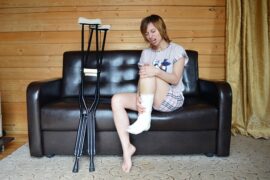Recovering from a brain injury can be frustrating. You or a loved one might feel bed-bound and embarrassed, potentially leading to triggering episodes that make any traumatic brain injury (TBI) worse. These are a few gentle steps to recovery that anyone can use alongside guidance from their doctor. The experience will be more manageable, and you will feel in control of your journey.
1. Keep Your Eyes Closed
Resting your eyes may seem easy, but it’s an odd sensation for anyone who’s used to using them every day. Focus on your doctor’s advice if you get frustrated with this first step to healing. Closing your eyes during the first few days of your TBI recovery will help immensely.
When a TBI occurs, your brain swells but your skull remains the same size. The swollen brain tissue slows down electrical currents associated with bodily functions like visual tracking. You could make the swelling worse by processing too much visually. Close your eyes while you’re at home and especially if you have to be driven to your doctor.
2. Request Extra Time
Your brain will need extra time to think through things as it recovers. Ask for additional time to complete work or school assignments. Thinking too hard or staring at a screen for too long will complicate the healing process and trigger specific symptoms, like dizziness. Taking breaks will ease you back into your routine when your doctor clears you for work or school.
3. Close The Blinds
Dimming the lights does wonders for anyone recovering from a TBI. Bright lights and natural sunlight can affect people at all stages of their recovery process. Even if your doctor decides you’ve reached level eight of the Rancho Los Amigos Cognitive Scale – the scale that medical staff use to evaluate a brain injury patient’s level of brain damage and recovery prognosis – bright lights could still exacerbate headaches and make you dizzy.
Close the blinds while you or a loved one recovers at home. Keep any lamps turned off or dimmed to their lowest brightness. It’s also wise to avoid leaving home when drivers need to use their headlights.

4. Wear A Smartwatch
Many people don’t realize that TBIs often raise a person’s resting heart rate and cause unusual cardiac symptoms. The heart responds to stimuli from the nervous system and the brain, so swollen tissue and disrupted neuroelectric impulses can lead to palpitations and unexpected increases in its rate.
Monitoring your heart by wearing a smartwatch is an easy way to track your recovery. You’ll know your new resting heartbeat and what level it can rise to before symptoms like dizziness begin. Finding that threshold will help you recover faster because you’ll better understand your body.
5. Ask Someone To Track Your Symptoms
You likely won’t be able to write anything for a while if you have a TBI. Ask a loved one to track your symptoms in a journal if that’s the case. They can give the records to your doctor so everyone involved in your recovery knows which symptoms are fading and if any problems linger longer than expected. You’ll get more accurate medical advice if your doctor gets more specific information about your daily symptoms.
6. Learn How To Meditate
Taking slow, deep breaths is often very helpful for people recovering after a brain injury. They slow your heart rate while your eyes stay closed and minimize any stress related to your healing. Learning how to meditate by pacing your purposeful breathing will help you feel more at ease while taking things slowly after your injury.

7. Visit Your Doctor Frequently
Talk with your doctor about how often you’ll need to visit for follow-up MRI scans and consultation after your injury. Even if your visit happens virtually, you’ll have an easier recovery experience with their updated guidance. Every injury requires different care, so ask about follow-up scans and appointments as soon as possible to get your unique recovery guidance.
Recover After A Brain Injury
These are a few steps to aid in brain injury recovery that many people take to make the experience more manageable. Alongside advice from your doctor, you can do things like monitor your heart rate and close your eyes to improve your chances of getting better much faster!



































